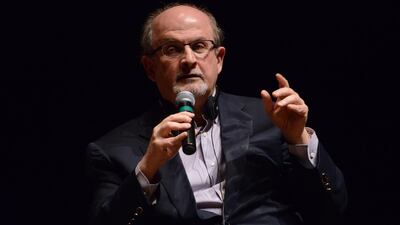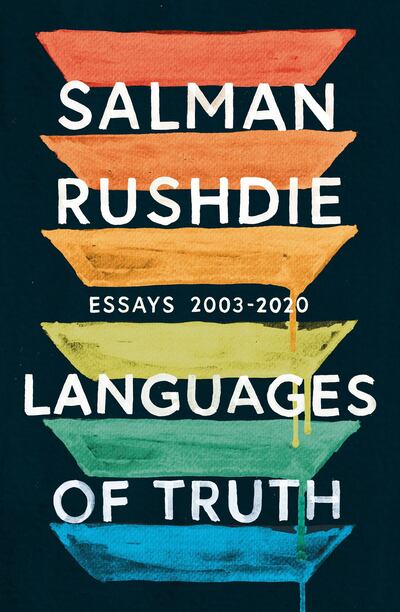The experience of reading collections of non-fiction work can often help put the topical concerns of social media and newspaper reporting into a historical perspective.
Two standout collections from the last decade have been the late Christopher Hitchens's Arguably (2011) and Zadie Smith's Feel Free (2018), which approach everything from Jay Z to Iran with the literary confidence that standard reporting rarely manages to muster. Non-fiction collections also allow authors to show off their argumentative ability in ways that novels, mostly, do not.
Salman Rushdie, the bestselling author of Midnight's Children (1981) and The Satanic Verses (1988), has just published his second non-fiction collection Languages of Truth: Essays 2003-2020. It compiles previously published essays, speeches and interviews and new writing in four separate parts.
Rushdie deals with big philosophical questions like truth, courage, liberty and the nature of stories, while also addressing pop-cultural and literary figures such as Carrie Fisher, Muhammad Ali, Philip Roth and Samuel Beckett.
Languages of Truth feels like a second act: coming after his first collection of essays, Step Across This Line: Collected Nonfiction 1992-2002. His first non-fiction offering deals with urgent topics: the fatwa announced against him by the Ayatollah Ruhollah Khomeini in 1989, the success of his novel Midnight's Children, 9/11 and the disputed election of George W Bush.
While his first collection spanned 10 years, his new book covers 17, from the start of the Iraq War to the coronavirus pandemic. The result is, sometimes, a loss of relevance. His various commencement addresses and speeches from the 2000s would have been better served in a separate collection covering that decade.
Instead, Rushdie’s essays are placed non-chronologically in the book. There are also few dates indicating when the pieces were written. Consequently, a reader never knows when Rushdie’s writing is contemporaneous or retrospective.
The first part of the collection is ambitious and addresses the big questions of literature: storytelling, truth, morals and reality, but the essays feel loose, digressive and sometimes conversational. It is often hard to follow his arguments to a convincing conclusion.
In a later essay, Autobiography and the Novel, Rushdie attacks the current fashion for real-life narratives in novels as a "self-regard [that] has never been so well regarded". Amid such "promiscuity of revelation", he asks "how can art compete?"The last essay in the first part of the book, Another Writer's Beginnings, is autobiographical and straightforward. It brilliantly describes Rushdie's struggles as a migrant, a member of an ethnic minority group and a frustrated young writer in England whose "road" to literary fame was "full of potholes." His public boarding school, Rugby, teaches him "everything" about "racism". While studying at Cambridge, however, he "discovers a tolerant Britain that erase[s]...memories of another racist one".
Ironically, Rushdie is at his most engaging in Languages of Truth when he writes about current affairs and events through the prism of his own life and times. This is because he has a unique perspective: he was born in Mumbai, educated at elite institutions in England and currently holds American citizenship.
This has allowed him to have a foot in both colonial and post-colonial cultures; in both the 20th and 21st centuries and the old world and the new. He also has years of experience of writing about three of the world’s most important democracies: the UK, the USA and India.
His comments on Britain’s imperial legacy are especially timely and arrive as the UK, sparked by the toppling of the slave trader Edward Colston’s statue in Bristol last year, begins to debate the meaning of its colonial history.
Rushdie's contribution to this debate has been made through his beloved novels such as Midnight's Children, Shame (1983) and Quichotte (2019). In Languages of Truth, his arguments about empire are spread across various essays.
He makes the point that Britain, and the West more broadly, still does not understand the complexity of their own or India’s history because “so much of it happened overseas”. For Rushdie, a historical example of this lack of understanding can be found in the names used by historians to describe the same event: “During the British Empire, the military revolt of 1857 was known as the ‘Indian Mutiny’, a mutiny is a rebellion against the authorities...the meaning of that fact, placed the ‘mutinying’ Indians in the wrong. Indian historians today refer to this event as the “Indian Uprising”, which makes it an entirely different sort of fact.”
He also draws interesting parallels between the exoticism of old "Western movies about India [that featured] blonde white women arriving there to find, almost at once, a maharajah to fall in love with", and Danny Boyle's Slumdog Millionaire (2009) which replaces "raj tourism" with "slum tourism".
In Languages of Truth, Rushdie is explicit about the important role the "imagination" plays in distinguishing fiction from memoir. However, the non-fiction essay's similar reliance on compelling argument doesn't seem, in this collection, to be fully realised.
When Languages of Truth does decide to offer a proper argument, we see Rushdie at his best: perceptive, funny, cosmopolitan and brave.


